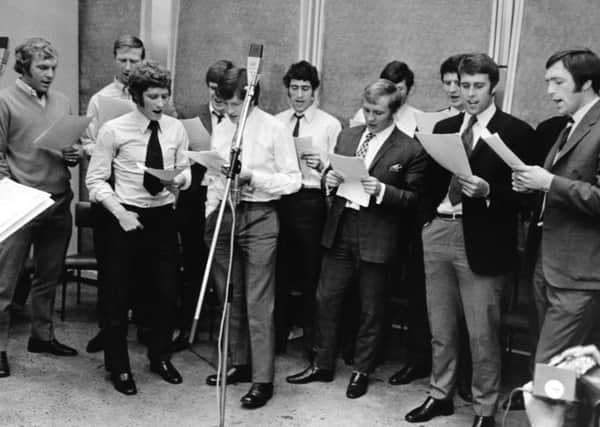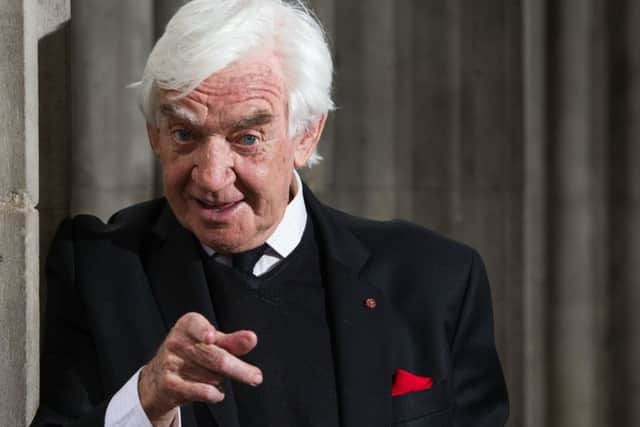'˜A daft football team hiding daft dreams under daft perms'


It’s a cacophony, and maybe not a place for the fitba-minded, but listen carefully and familiar refrains can be detected. Not terracing chants, but the songs aimed directly at what used to be called the Hit Parade, sung by actual, real footballers, occasionally with the help of football-mad celebs.
Bill Martin is a legendary tunesmith-for-hire and, like Sir Alex Ferguson, part of the Govan Hall of Fame. As he explains in his Fringe entertainment looking back on his gold record-studded career, his first recorded song bombed after being released the day President Kennedy was assassinated. He had more luck in 1967 with Puppet on a String, his first co-credit with Phil Coulter which won Britain the Eurovision Song Contest, and later the pair would contrive the clodhopping beat of the Bay City Rollers’ biggest successes. But the song of which he’s most proud is Back Home, sung by England’s 1970 World Cup squad.
Advertisement
Hide AdAdvertisement
Hide AdMartin is a failed footballer, getting as far as a few games for Johannesburg Rangers, who sometimes lost the first part of their name if anyone ever asked, so the opportunity to fraternise with superstars like Bobby Moore – even superstars who, Scottish schoolboys used to joke, were firmly in touch with their feminine side – was a big thrill.


“Walks like a woman and he wears a bra” was a popular chant in my playground and yet I would pester my father to drive aimlessly around the city limits on Sunday mornings so he’d need to refuel and I might have the chance to complete my coin collection, the fake-silver images of the England squad being given away free with petrol.
This was a slightly calmer era in Jock-Sassenach relations, although we never had to deal with England retaining the World Cup because the goalkeeper, who I think was nicknamed Tiddles, clawed the rarefied Mexican air like he was trying to snare a ball of wool and our friends and neighbours exited at the quarter-final stage.
But Back Home, with that surging chorus, soared to No 1 in the charts. Martin was chuffed to see the players gather round the microphone, with the best communal-bath crooners at the front, although there was some grumpy opposition from the big boss.
“Alf Ramsey said: ‘My boys are athletes, they are not performers – how dare you take up my time’,” Martin recalled in The Scotsman. “But I told the team: ‘Look, you’ll be able to tell your grandchildren you were on Top of the Pops’.” Possibly these grandchildren asked: “Was that the show where girls in the audience got groped by the DJs?” Well, copies of the team’s platter flew out of the shops at the rate of 100,000 a day. Martin still reckons it could have been the best-selling single of all time if Ramsey hadn’t hooked Bobby Charlton in the fateful game against West Germany.


In another part of Edinburgh, on a different stage, Andrew Macmillen has been reminding the international audience of Scotland’s proud World Cup record in those years when England didnae qualify, while singing a megamix of our three World Cup songs from Argentina 1978. Three? I’d forgotten there was a hat-trick of them. Ally’s Tartan Army by Andy Cameron is difficult to dislodge from the national consciousness jukebox. Then there was Rod Stewart’s Ole Ola in which he namechecked most of the squad then declared: “With this lethal combination/It’s a fair estimation/That the World Cup will be ours the end of June.”
Rod – another failed footballer, of course – was determined this would happen. So determined that he was prepared to sound posh-English for the sake of a rhyme in the chorus (“We’re gonna bring that World Cup back from over thah”). So determined, indeed, that he released a second World Cup track, Que Sera Sera. This is the one that slipped my mind and it’s little wonder. It starts with a burst of classic Archie Macpherson commentary: “Oh yes! You have never heard noise like this in all your life!” Then the music starts, the band sounding as refreshed as Stewart when he was fiddling with his balls during that Scottish Cup draw.
Advertisement
Hide AdAdvertisement
Hide AdStrung together by Macmillen in his one-man play, called Don’t Cry for Me Kenny Dalglish, you wonder what the hell we, the expectant nation, were playing at. But this was a grim theory which only occurred to us in the 71st minute against Peru when Teofilo Cubillas, wrongly assumed to be in an old folks home in Lima, scored his first goal – and was reinforced in the 77th when he banged his second past our goalie, described by David Coleman as “inelastic”.
As usual with songs, one sparks another. I haven’t been able to stop singing How I Wrote ‘Elastic Man’ by the Fall, who were, of course John Peel’s favourite band. Peel is referenced on the B-side of the Cameron anthem in Ah Want Tae Be a Punk Rocker, as is Fiona Richmond who I understand was popular in gentleman’s periodicals of the 1970s (though not Stewart’s favourite, Model Train Monthly). And Peel of course idolised Dalglish.
Macmillen’s character in the drama worships King Kenny, too, and is devastated when he quits Celtic for Liverpool. But the real tears don’t come then or when Scotland leave the World Cup in ignominy, rather when he learns the fate of his Argentinian girlfriend in a country where, as the final played out, opponents of the dictatorship were tortured, drugged and thrown out of planes.
It’s powerful stuff and a reminder there were issues more important than a daft football team with a daft winger who harboured daft plans under their daft perms. Macmillen’s show finished its Edinburgh run last night but Martin’s The Stories Behind the Songs continues at the Dome until 27 August.
Next year, maybe look out for Christian, Motherwell’s showbiz titan, with his World Cup-themed show – How BA Robertson Wrote ‘We Have a Dream’.